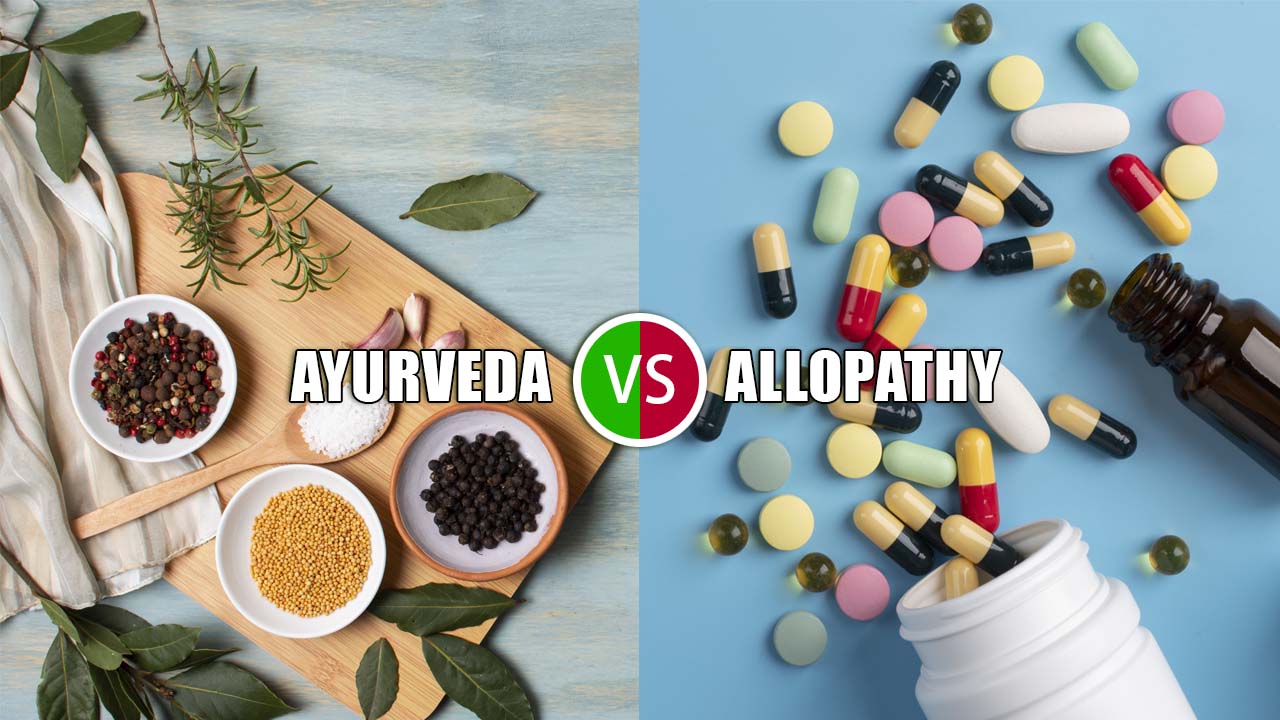The eternal debate between Ayurveda and Allopathy has captured the attention of many. It’s a clash of beliefs and practices, where some find solace in the proven health benefits of Ayurveda, while others place their trust in the path of Allopathy. The origins of these two approaches to medicine are deeply rooted in history.
Allopathy, the modern system of medicine, emerged relatively recently in the 16th century, while Ayurveda, a traditional and intricate healing science, dates back to the ancient times of the 2nd millennium BCE.
Ayurveda vs Allopathy
Ayurveda and Allopathy represent two distinct paradigms in healthcare, each with its own principles, treatments, and benefits. Let’s delve into the characteristics of both approaches to gain a better understanding.
Ayurveda: An Ancient Holistic Tradition
Ayurveda, a Sanskrit term meaning “knowledge of life,” is an ancient holistic healthcare system that originated in India over 5,000 years ago. It encompasses a comprehensive approach to health, focusing on the balance between the body, mind, and spirit. Ayurvedic medicine emphasizes the prevention of diseases by promoting a harmonious lifestyle, including diet, herbs, meditation, and yoga.

- Principles of Ayurveda: Ayurveda is built upon three fundamental principles known as doshas, which are the energies that govern the human body. The three doshas—Vata, Pitta, and Kapha—represent different aspects of bodily functions and need to be balanced for optimal health. Ayurvedic practitioners identify an individual’s unique constitution and tailor treatments accordingly.
- Ayurvedic Treatments: Ayurveda employs a wide range of treatments, including herbal remedies, massages, detoxification techniques, and lifestyle recommendations. Panchakarma, a popular Ayurvedic detoxification therapy, aims to remove toxins from the body and restore balance. Ayurvedic medicines are derived from natural sources and emphasize the use of herbs and plant-based compounds.
- Benefits of Ayurveda: Ayurveda offers several potential benefits, such as improved digestion, reduced stress, enhanced immunity, and increased overall well-being. By addressing the root cause of illnesses and promoting balance, Ayurvedic practices can support long-term health and vitality.
Allopathy: Modern Scientific Medicine
Allopathy, also known as conventional or modern medicine, is the dominant medical system practiced worldwide. Developed during the scientific revolution, allopathic medicine focuses on evidence-based diagnosis and treatment using pharmaceutical drugs, surgeries, and advanced medical technologies.

- Principles of Allopathy: Allopathic medicine is based on the principles of scientific research, clinical trials, and a reductionist approach to understanding diseases. It places a strong emphasis on accurate diagnosis, utilizing laboratory tests, medical imaging, and physical examinations to identify and treat specific ailments.
- Allopathic Treatments: The treatments in allopathy typically involve the use of pharmaceutical drugs, surgeries, vaccinations, and other interventions. Allopathic physicians specialize in various branches, such as cardiology, neurology, and oncology, to provide specialized care for specific medical conditions.
- Benefits of Allopathy: Allopathic medicine has made remarkable advancements in diagnosing and treating acute and chronic diseases. The utilization of advanced technologies, surgical procedures, and pharmaceutical interventions has significantly improved patient outcomes and survival rates. Allopathy has a strong focus on evidence-based practices, and its treatments are subjected to rigorous scientific scrutiny.
Allopathy treats symptoms and Ayurveda uproots symptoms
When we delve into the world of Allopathy, we encounter a methodology focused on treating symptoms and ailments through tried and tested approaches. It is a term that describes the modern medical systems we are familiar with. Allopathic treatments rely on scientifically approved techniques that aim to heal the symptoms, yet often overlook the root cause of the illness. The process involves the use of chemical-based drugs that may effectively combat diseases but also come with a significant risk of side effects.
On the other hand, the study of Ayurveda revolves around the core concepts of Lakshana, Swastha, and Vyadhi, which analyze symptoms to identify the underlying cause of the disease. Through methods like investigation, palpation, and cross-examination, Ayurveda takes a comprehensive approach to accurately identify and address the manifestations of illness. Prominent institutions such as the Sri Sai Institute of Ayurvedic Research and Medicine have dedicated themselves to blending traditional principles with modern advancements, creating a unique and effective form of Ayurvedic medicine.
One of the fundamental distinctions between Ayurveda and Allopathy lies in their approach to treatment. While Allopathy focuses on alleviating symptoms, Ayurveda aims to uproot the ailment from its very core. Ayurvedic treatments are holistic, natural, and safe, free from the burden of side effects. Ayurveda places great emphasis on the balance of doshas, the vital elements that constitute the human body. According to Ayurvedic philosophy, an individual falls ill when these doshas are imbalanced. Vatta, Pitta, and Kapha are the three primary doshas responsible for physical and mental well-being. A proficient Ayurvedic practitioner, armed with a BAMS degree from a reputable institution, can swiftly determine a patient’s dosha and streamline the treatment process accordingly.
Cost of Treatment
The cost of treatment is a significant factor to consider when comparing Ayurveda and Allopathy. Allopathic treatments, especially those offered by renowned hospitals, often come with exorbitant price tags. They place a heavy financial burden on patients and their families, leading to anxiety and emotional distress. Conversely, ayurvedic treatments prioritize lifestyle modifications, proving to be cost-effective and sustainable in the long run. Ayurveda’s focus on natural and simple healing methods makes it an affordable alternative, offering a permanent and positive transformation in the lives of individuals seeking treatment.
Chronic lifestyle diseases
In the face of modern-day challenges, chronic lifestyle diseases have become increasingly prevalent. Conditions like polycystic ovarian syndrome (PCOS), Rheumatoid Arthritis, diabetes, and congenital heart disorders have become distressingly common. While Allopathy often provides temporary relief, Ayurveda, in conjunction with modern treatment methodologies, shows promising results in offering permanent solutions to these chronic ailments. It is a beacon of hope for those in search of lasting relief and improved quality of life.

Despite the inherent strengths of Ayurveda, it faces challenges in establishing itself as a credible and scientifically rooted form of treatment. Modernization is a pressing need for Ayurvedic practices, an accomplishment achieved by only a handful of institutions like The Sri Sai Institute of Ayurvedic Research and Medicine. Furthermore, misinformation has cast a shadow on the trust people place in traditional systems of medicine, which has only been exacerbated during the COVID-19 pandemic. Unqualified individuals claiming magical cures have sowed seeds of doubt and skepticism among the masses.
Frequently Asked Questions (FAQs):
1. What is the main difference between Ayurveda and Allopathy?
Ayurveda is a holistic healthcare system that emphasizes balance and natural remedies, while Allopathy focuses on scientific diagnosis and pharmaceutical treatments.
2. Can Ayurveda and Allopathy be used together?
Ayurveda and Allopathy can complement each other in certain cases. It is advisable to consult healthcare professionals well-versed in both systems for an integrative approach.
3. Are Ayurvedic medicines safe?
Ayurvedic medicines are generally safe when obtained from reputable sources and used as prescribed. However, it is crucial to consult an Ayurvedic practitioner for personalized recommendations and to ensure quality and safety.
4. Are Allopathic treatments always necessary?
Allopathic treatments are recommended based on evidence-based practices and individual medical conditions. In certain cases, non-invasive or alternative approaches may also be effective, and it is essential to consult with a qualified healthcare professional.
5. Which approach is better, Ayurveda, or Allopathy?
The choice between Ayurveda and Allopathy depends on individual preferences, health conditions, and the severity of the illness. It is advisable to consult healthcare professionals and explore both options to make informed decisions.
6. Can Ayurveda cure chronic diseases?
Ayurveda focuses on holistic healing and aims to address the root cause of diseases. While it may not cure chronic diseases entirely, it can provide relief, manage symptoms, and improve overall well-being.
Conclusion
In conclusion, it is impossible to definitively declare Ayurveda superior to Allopathy. Ayurveda surpasses Allopathy in several aspects of healthcare. It provides an affordable alternative to the expensive nature of Allopathic treatments, which often fail to offer lasting solutions. Ayurveda’s holistic approach addresses the root cause of ailments, ensuring a safe and effective path to recovery. Moreover, it proves to be a reliable and gentle treatment for vulnerable groups such as children, pregnant women, and the elderly. By incorporating natural herbs, vegetables, and fruits, Ayurvedic medicines offer relief without causing harm to the body.
Ayurveda possesses the power to strengthen and protect, a feat that Allopathy may never fully achieve. Its focus on holistic and straightforward treatment makes it a remarkable solution for chronic diseases. However, to gain wider acceptance and legitimacy, Ayurveda must combat misinformation and bias. Institutions and hospitals dedicated to Ayurveda should strive to develop modern solutions and equipment, encouraging people to embrace this ancient yet contemporary form of healing.
While Ayurveda triumphs over Allopathy in critical areas of healthcare, we cannot deny the widespread acceptance and trust placed in Allopathy as a popular form of medicine. The amalgamation of Ayurvedic principles with modern techniques represents a significant step towards promoting a safe, traditional, and contemporary form of healing like Ayurveda. Our hope is that this comprehensive article helps dispel your doubts surrounding the Ayurveda vs. Allopathy debate, and paves the way for informed decisions regarding your health and well-being.
Disclaimer: The information provided in this article is for educational purposes only and does not constitute medical advice. Consult with a qualified healthcare professional before making any changes to your diet or lifestyle.

